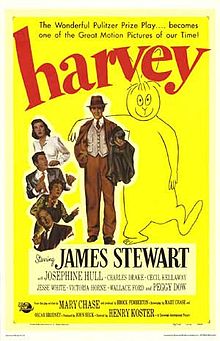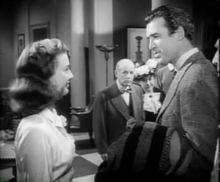- Harvey (film)
-
Harvey 
Original posterDirected by Henry Koster Produced by John Beck Written by Mary Chase
Oscar Brodney
Myles Connolly (Uncredited)Starring James Stewart
Josephine Hull
Peggy Dow
Charles DrakeMusic by Frank Skinner Cinematography William H. Daniels Distributed by Universal International Pictures Release date(s) October 13, 1950 Running time 104 minutes Country United States Language English Harvey is a 1950 film based on Mary Chase's play of the same name, directed by Henry Koster, and starring James Stewart and Josephine Hull. The story is about a man whose best friend is a pooka named Harvey—in the form of a six-foot, three-and-one-half-inch tall invisible rabbit.
Contents
Plot
Elwood P. Dowd (Stewart) is a middle-aged, amiable (and somewhat eccentric) individual whose best friend is an invisible 6' 3.5" tall rabbit named Harvey. As described by Dowd, Harvey is a pooka, a benign but mischievous creature from Celtic mythology who is especially fond of social outcasts (like Elwood). Elwood has driven his sister and niece (who live with him and crave normality and a place in "society") to distraction by introducing everyone he meets to his friend, Harvey. His family seems to be unsure whether Dowd's obsession with Harvey is a product of his (admitted) propensity to drink or perhaps mental illness. Elwood spends most of his time in the local bar, and throughout the film invites new acquaintances to join him for a drink (or to his house for dinner). Interestingly, the barman and all regulars accept the existence of Harvey, and the barman asks how they both are and unflinchingly accepts an order from Elwood for two Martinis.
His sister, Veta Louise Simmons (Hull), tries to have Elwood committed to a sanatorium. In exasperation, she admits to the attending psychiatrist Dr. Lyman Sanderson (Charles Drake) that, after so many years of putting up with the invisible rabbit, she sees Harvey every once in a while. This causes Dr. Sanderson to let Elwood out and lock Veta up. After sorting out the mistake, Dr. Chumley, head of the sanatorium (Cecil Kellaway) decides that to save the reputation of the sanatorium he must bring Elwood back. At one point, when her daughter asks how someone possibly could imagine a rabbit, Veta says to her "Myrtle Mae, you have a lot to learn and I hope you never learn it".
When tracked down, Elwood goes through several ordeals, although he remains largely oblivious to the plans put in place for him by Dr. Chumley, Judge Gaffney (William Lynn) and Veta Louise. In a poignant scene where Dr. Sanderson and his nurse Miss Kelly (Peggy Dow) follow Elwood into an alley at the back of his and Harvey's favorite bar, Charlie's, Elwood tells the incredible story of how he came to meet Harvey, and explains the way in which people react when they meet them. In a later scene, he gives Dr. Chumley an insight into his philosophy of life:
Years ago my mother used to say to me, she'd say, "In this world, Elwood, you must be" – she always called me Elwood – "In this world, Elwood, you must be oh so smart or oh so pleasant." Well, for years I was smart. I recommend pleasant. You may quote me.Elwood also explains that Harvey has the power to stop time: "Did I tell you he could stop clocks? Well, you've heard the expression 'His face would stop a clock'? Well, Harvey can look at your clock and stop it. And you can go anywhere you like — with anyone you like — and stay as long as you like. And when you get back, not one minute will have ticked by. ... You see, science has overcome time and space. Well, Harvey has overcome not only time and space — but any objections."
In the final scene of the film, Elwood (along with everybody else) arrives back at the hospital. By this point, Dr. Chumley is not only convinced of Harvey's existence, but has begun hanging out with him on his own, with a mixture of admiration and fear.
Dr. Sanderson convinces Elwood to come into his office where he'll receive a serum that will stop Dowd from "seeing the rabbit". As they are preparing for the injection, Elwood's sister is told by their cab driver about all the other people he has driven to the sanatorium to receive the same medicine, warning her that Elwood will become "just a normal human being. And you know what stinkers they are." Upset by the very thought of this, Veta halts the procedure by banging on the examining room door, at which point Elwood comforts her and explains her tears to others with, "Veta's all tired out, she's done a lot today".
 Miss Kelly (Peggy Dow) and Dowd (James Stewart). Judge Gaffney (William H. Lynn) is in the background.
Miss Kelly (Peggy Dow) and Dowd (James Stewart). Judge Gaffney (William H. Lynn) is in the background.
As Elwood is leaving, Dr Chumley asks Elwood for Harvey's help, and Elwood, being the obliging fellow he is, makes no objection. Dr Chumley, arm in arm with an invisible companion, asks 'Have you ever been to Akron?'. The inference being that Harvey will now use his power to stop clocks and mystically transport Dr Chumley to a personal paradise, in Akron, Ohio.
After the gates to 'Chumley's Rest' are closed, and Elwood is leaving, he stops, turns around and has a conversation with an invisible Harvey, who is already back from his trip to Akron and reaffirms their friendship. Elwood and his invisible companion saunter off towards the Bus stop, following Veta and Myrtle Mae, towards the planned last stop of Charlies Bar and another drink.
Cast
- Elwood P. Dowd: James Stewart
- Veta Louise Simmons: Josephine Hull
- Miss Kelly: Peggy Dow
- Dr. Lyman Sanderson: Charles Drake
- Dr. Willie Chumley: Cecil Kellaway
- Judge Gaffney: William H. Lynn
- Myrtle Mae Simmons: Victoria Horne
- Marvin Wilson: Jesse White
- Cab Driver: Wallace Ford
- Mrs. Chumley: Nana Bryant
- Mrs. Chauvenet: Grayce Mills
- Harvey: Himself
Reception
TV Guide said James Stewart gave "one of his finest performances in this lighthearted film", and it currently has five out of five stars on their site.[1]
Home Video Release
In March of 1990, James Stewart recorded a special narrative introduction, that would be combined with many of the film's still-photos, which would be added to the film's original release on VHS. MCA Home Video released Harvey on VHS in 1990.
Honors
Hull's performance earned her an Academy Award as Best Supporting Actress; Stewart's portrayal earned him a Best Actor Oscar nomination. Stewart later declared in an interview that Hull had the most difficult role in the film, since she had to believe and not believe in the invisible rabbit... at the same time.
This film was ranked #35 on AFI's 100 Years... 100 Laughs.
In June 2008, AFI revealed its "10 Top 10"—the best ten films in ten "classic" American film genres—after polling over 1,500 people from the creative community. Harvey was acknowledged as the seventh best film in the fantasy genre.[2][3]
American Film Institute recognition
- 2000: AFI's 100 Years... 100 Laughs #35
- 2008: AFI's 10 Top 10 #7 Fantasy
Remakes and other uses
The play/film was made for television several times:
- 1958, in a version starring Art Carney as Elwood.
- 1970, in a version for West German television, with Heinz Rühmann as Elwood.
- 1972, in a version also starring James Stewart and featuring Helen Hayes as his sister Veta.
- 1985, in a version for West German television, with Harald Juhnke as Elwood and Elisabeth Wiedemann as Veta.
- 1998, starring Harry Anderson and Swoosie Kurtz in the Elwood and Veta roles.
In August 2009 it was announced that Steven Spielberg was to direct a remake of the film, with production beginning in 2010. The film would be a co-production between 20th Century Fox and Spielberg's DreamWorks Studios, and novelist Jonathan Tropper had written the adaptation for the new version. Spielberg approached Tom Hanks and later Robert Downey, Jr. for the lead role, but in December 2009 Spielberg opted out after a dispute over his vision for the project.[4][5][6]
In addition, the Jimmy Stewart Museum, based in Stewart's hometown of Indiana, Pennsylvania, presents the Harvey Award to a distinguished celebrity tied to Jimmy Stewart's spirit of humanitarianism. Past recipients include Robert Wagner, Shirley Jones, Janet Leigh, and Rich Little.
A scene in the film Who Framed Roger Rabbit has a barfly confessing, "I seen the rabbit" (meaning Roger, who is being sought). He puts his arm around an invisible presence and says, "Say hello ... Harvey!"
References
- ^ "Harvey (1950)". http://movies.tvguide.com/harvey/125489. Retrieved May 5, 2010.
- ^ American Film Institute (2008-06-17). "AFI Crowns Top 10 Films in 10 Classic Genres". ComingSoon.net. http://www.comingsoon.net/news/movienews.php?id=46072. Retrieved 2008-06-18.
- ^ "Top 10 Fantasy". American Film Institute. http://www.afi.com/10top10/fantasy.html. Retrieved 2008-06-18.
- ^ [1][dead link]
- ^ Sampson, Mike (2009-12-04). "Spielberg drops Harvey". JoBlo.com. http://www.joblo.com/index.php?id=29842. Retrieved 2010-12-06.
- ^ "Spielberg hops onto update of rabbit tale 'Harvey'". The Associated Press. 3 August 2009. http://www.newsday.com/spielberg-hops-onto-update-of-rabbit-tale-harvey-1.1343739. Retrieved 24 October 2011.
External links
- Harvey at the Internet Movie Database
- Harvey at AllRovi
- Transcript of a July 1997 memorial for Stewart from The NewsHour with Jim Lehrer, which includes scenes from and commentary on Harvey
Films directed by Henry Koster 1930s Three Smart Girls (1936) · One Hundred Men and a Girl (1937) · The Rage of Paris (1938) · Three Smart Girls Grow Up (1939) · First Love (1939)1940s Spring Parade (1940) · It Started with Eve (1941) · Between Us Girls (1942) · Music for Millions (1944) · Two Sisters from Boston (1946) · The Unfinished Dance (1947) · The Bishop's Wife (1947) · The Luck of the Irish (1948) · Come to the Stable (1949) · The Inspector General (1949)1950s Wabash Avenue (1950) · My Blue Heaven (1950) · Harvey (1950) · No Highway in the Sky (1951) · Mr. Belvedere Rings the Bell (1951) · Elopement (1951) · Stars and Stripes Forever (1952) · My Cousin Rachel (1952) · The Robe (1953) · Désirée (1954) · A Man Called Peter (1955) · The Virgin Queen (1955) · Good Morning, Miss Dove (1955) · D-Day the Sixth of June (1956) · The Power and the Prize (1956) · My Man Godfrey (1957) · Fräulein (1958) · The Naked Maja (1958)1960s The Story of Ruth (1960) · Flower Drum Song (1961) · Mr. Hobbs Takes a Vacation (1962) · Take Her, She's Mine (1963) · Dear Brigitte (1965) · The Singing Nun (1966)AFI's 100 Years...100 Laughs 1–10 11–20 The Producers • A Night at the Opera • Young Frankenstein • Bringing Up Baby • The Philadelphia Story • Singin' in the Rain • The Odd Couple • The General • His Girl Friday • The Apartment
21–30 31–40 41–50 51–60 61–70 What's Up, Doc? • Sherlock, Jr. • Beverly Hills Cop • Broadcast News • Horse Feathers • Take the Money and Run • Mrs. Doubtfire • The Awful Truth • Bananas • Mr. Deeds Goes to Town
71–80 Caddyshack • Mr. Blandings Builds His Dream House • Monkey Business • Nine to Five • She Done Him Wrong • Victor Victoria • The Palm Beach Story • Road to Morocco • The Freshman • Sleeper
81–90 91–100 The Heartbreak Kid • Ball of Fire • Fargo • Auntie Mame • Silver Streak • Sons of the Desert • Bull Durham • The Court Jester • The Nutty Professor • Good Morning, Vietnam
Categories:- 1950 films
- American films
- English-language films
- 1950s comedy films
- American comedy films
- Black-and-white films
- Fantasy films
- Films based on plays
- Films directed by Henry Koster
- Films featuring a Best Supporting Actress Academy Award winning performance
- Films set in Colorado
Wikimedia Foundation. 2010.

